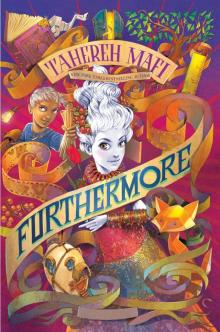- Home
- Tahereh Mafi
This Woven Kingdom Page 8
This Woven Kingdom Read online
Page 8
Kamran’s eyes widened a fraction. “How dare y—”
“Everyone thinks you saved my life because you are compassionate and kind. If you threw me in the dungeon now, it would not look good for you, would it?”
Kamran’s fists clenched, unclenched. “I did save your life, you ungrateful wretch.”
“Han.” Yes. The child almost smiled, but his eyes were strangely distant. “Pet, shora?” But, why? “After this, I will be returned to the street. To the same life as before.”
Kamran felt an unwelcome pang in the region of his chest; a flicker of conscience. He was quite unaware that the edge to his voice had gone when he said, “I do not understand why you would rather kill yourself than go to prison.”
“No, you do not understand, sire.” The redheaded boy would not meet his eyes. “But I have seen what they do to kids like me. Being turned over to the magistrates is worse than death.”
Kamran straightened, then frowned. “What can you mean? How can it be worse than death? Our prisons are not so foul as that. You would be offered a daily meal, at the very least—”
The boy was now shaking his head hard, looking so agitated Kamran feared he might bolt from the room.
“All right—enough,” the prince said reluctantly, and sighed. “You may instead tell me what you know of the girl.”
The boy froze at that, the inquiry unexpected enough to have disarmed him. “Know of her? I do not know her, sire.”
“How, then, were you able to communicate with her? Do you speak much Ardanz?”
“Very little, sire.”
“And yet, you spoke with her.”
“Yes, sire.” The boy blinked. “She spoke Feshtoon.”
Kamran was so surprised by this revelation he failed to mask his expression fast enough. “But there are no servants in the royal city who speak Feshtoon.”
“Begging your pardon, sire, but I didn’t know you were acquainted with all the servants in the royal city.”
At that, Kamran experienced a swell of anger so large he thought it might break open his chest. It took all he had to bite out the words: “Your insolence is astonishing.”
The boy grinned; Kamran resisted the urge to smother him.
This redheaded Fesht boy had the uncommon ability to move Kamran to a swift, discomposing anger—an anger of the most dangerous variety. Kamran knew this, for he knew well his own weaknesses, and implored himself to defuse what he knew to be an irrational reaction. There was no reason to scare away the child, after all, not now that the boy might provide him with information he needed to hunt down the duplicitous servant girl.
“I beg you will help me understand,” Kamran had said flatly. “You claim that a servant girl with little education—a servant girl who is likely illiterate—somehow spoke to you in Feshtoon. You claim she gave you bread, which you di—”
“No, sire. I said that she offered me bread.”
Kamran’s jaw tensed. This was the second time the child had interrupted him. “I see little difference,” he’d said. “Gave and offered are interchangeable words.”
“No, sire. She told me to come to the kitchens at Baz House if I was in need of bread.”
Here, Kamran experienced a moment of triumph.
“Then she lied to you,” said the prince. “I know Baz House, and that girl is no servant there. In fact, if it has not yet been made obvious to you, you should know: that girl was no servant at all.”
The child shook his head. “You’re wrong, sire.”
Impertinent, disrespectful, shameless boy. Kamran found he no longer cared that the child had nearly died; he seemed well enough now, with the audacity of an impudent street rat, speaking to a member of the royal household with so little deference. And yet—Kamran was now shackled to him in this strange way, compelled to be kind to the precocious imp.
Omid. His name was Omid.
He was the son of saffron farmers in the south. His parents had been imprisoned for failing to pay taxes on a meager harvest, and their official complaint—Kamran had since pulled the report—was that the taxes were a fixed amount, instead of a percentage. Paying the fixed amount, they had insisted, would’ve meant starvation for their family, as the season’s crop had been so small. They had appealed to the courts for leniency, but had contracted lung fever in prison and died days later, leaving the boy to fend for himself.
Twelve, he’d said he was. Twelve years old.
“You are either very brave or very stupid,” Kamran had said to him. “To disagree with me so readily.”
“But, sire, you didn’t see her hands,” Omid insisted. “And I did.”
Kamran had only scowled.
In his haste to take his leave of the insufferable child, Kamran had forgotten, yet again, to pay his respects to the honorable priests and priestesses. He was instead intercepted by a halo of Diviners on his way out—who’d said little, as they were wont to do—and accepted as payment but a moment of his time before they pressed a small parcel into his hands. The prince offered his many thanks, but his mind, full and disordered as it was, bade him tuck away the untitled gift, to be opened at a later date.
The parcel would remain forgotten, for some days, in the interior pocket of Kamran’s cloak.
Unnerved by his conversation with Omid, the prince had gone straight from the Diviners Quarters to Baz House, the home of his distant aunt. He knew exactly where the kitchens were; he’d spent a great deal of his youth at Baz House, sneaking belowstairs for snacks after midnight. He considered going through the front doors and simply asking his aunt whether she’d employed such a servant, but he thought of his grandfather’s warning that his actions were now under intense scrutiny.
Kamran had many reasons for seeking out the girl—not the least of which was King Zaal’s confirmation that Ardunia was destined for war—but he did not think it wise to over-hastily spread word of this to the happy public.
In any case, Kamran was good at waiting.
He could stand in one position for hours without tiring, had been trained to practically disappear at will. It was no trouble at all to him to waste an hour standing in an alley to capture a criminal, not when his aim was to protect his empire, to spare his people the machinations of this faceless girl—
Lie.
True, that he found her actions suspect; true, too, that she might be a Tulanian spy. But there was also a possibility that he was wrong about the girl, and his unwillingness to accept this fact should’ve concerned him. No, the unadulterated truth, which he was only now willing to admit, was that there was a grain more to his motivations: something about this girl had burrowed under his skin.
He couldn’t shake it.
She—a supposed poor, lowly servant—had acted this morning with a mercy he could not understand, with a compassion that enraged him all the more for its inconstancy. The young woman had entered his empire, ostensibly, to do harm. Why should she have been the more benevolent actor this morning? Why should she have inspired in him a feeling of unworthiness?
No, no, it made no sense.
Years of training had taught the prince to recognize even the slightest inconsistencies in his opponents; weaknesses that could be mined and promptly manipulated. Kamran knew his own strengths, and his instincts in this instance could not be denied. He’d seen her contradictions from the moment he laid eyes on her.
She was without question hiding something.
He’d wanted to out her as the liar he knew her to be; to uncover what seemed to him one of only two possibilities: a treasonous spy, or a frivolous society girl playing pretend.
He had, instead, ended up here.
Here, standing in the dark so long the mobs had begun to disperse, the streets littered now with the drunk, sleeping bodies that dared not drag themselves home. Kamran had let the cold brace him until his bones shook, until he felt nothing but a large emptiness yawn open inside him.
He did not want to be king.
He did not want his grandfath
er to die, did not want to marry a stranger, did not want to father a child, did not want to lead an empire. This was the secret he seldom shared even with himself—that he did not want this life. It was hard enough when his father had died, but Kamran couldn’t even begin to imagine a world without his grandfather. He did not think he was good enough to lead an empire alone, and he did not know who he might rely upon instead. Sometimes he wasn’t even sure he could trust Hazan.
Instead, Kamran had distracted himself with his anger, had allowed his mind to focus on the irritations of the Fesht boy, the false face of a servant girl. The truth was that he’d been forced to return home against his will and was now running from himself, from the counterintuitive burden of privilege, from the responsibilities laid upon his shoulders. In moments like these he’d always consoled himself with the reassurance that he was at least a capable soldier, a competent leader—but today had disproven even that. For what good was a leader who could not even trust his own instincts?
Kamran had been bested by this servant girl.
Not only had she proven him wrong on all counts, she’d proven him worse. When she’d finally appeared in the alley behind Baz House, he’d recognized her at once—but had the privilege now of inspecting her more closely. Right away he noticed the angry cut at her throat, and from there he followed the elegant lines of her neck, the delicate slope of her shoulders. For the second time that day he noticed the way she carried herself; how different she seemed from other servants. There was a gracefulness even in the way she held her head, the way she drew her shoulders back, the way she’d tilted her face up at the sun.
Kamran did not understand.
If not a spy or society girl, she might perhaps be the fallen daughter of a gentleman, or even the bastard child of one; such circumstances might explain her elegant carriage and knowledge of Feshtoon. But for a well-educated child of a noble to have fallen this low? He thought it unlikely. The scandals in high society were most everyone’s business, and such a person in his aunt’s employ would doubtless have been known to him.
Then again, it was hard to be certain of anything.
In vain he’d fought for a better look at her face and was given instead only a mouth to study. He’d stared at her lips for longer than he cared to admit, for reasons that were not lost on him. Kamran had arrived at the frightening realization that this girl might be beautiful—a thought so unexpected it nearly distracted him from his purpose. When she suddenly bit her lip, he drew a breath, startling himself.
She seemed worried.
He watched as she searched the alley, all the while clutching a small parcel to her chest. Kamran remembered what Omid had said about her hands, peered closer, and was dealt at once a powerful blow to his pride, to his fragile conscience. The girl’s hands were so damaged he could see the injuries even from his distant vantage point. Her skin was painful to look at. Red. Blistered. Raw.
Without a doubt the hands of a servant.
Kamran rocked back on his heels as this truth washed over him. He’d been so determined the girl was a liar, had so eagerly anticipated the moment her ugliness would be uncovered. Instead, he’d made a discovery about himself.
He was the villain in this story, not she.
Not only had the girl kept her promise to Omid, but she’d made preparations; it grew increasingly obvious that what she sought in that alley had been the street child himself.
Twice in one day this faceless girl had inspired in Kamran a shame so vast he could hardly breathe around it. She’d reached into his chest and broken something essential inside of him, managed it all without even acknowledging his existence. Was Kamran so weak as to be dismantled thus by a stranger? Was he so unworthy?
Worse: how would he explain this embarrassment to his grandfather? So enthusiastically had Kamran added to the king’s worries with his poorly supported suspicions, and now the prince’s arrogance would prove only his own idiocy; an instability of mind that would further substantiate the king’s fears for his grandson. In a single day Kamran had made himself into a joke, and he wanted to sink into the earth.
It was his single thought, repeating like a drumbeat in his head, when Hazan finally found him.
Eleven
“MISS?”
The apothecarist cleared his throat again, and Alizeh startled. When she looked up, she saw the shopkeeper staring at her hands, which she snatched out of sight.
“I can see that you’re in pain, miss. A good deal, too, it seems.”
Slowly, Alizeh met his eyes.
“You need not fear me,” he said quietly. “If I’m to do my job, I must see the damage.”
Alizeh thought again of her work, how her safety and security depended on her waking up tomorrow and scrubbing yet more floors, stitching more gowns. But if this man saw her clear blood and realized she was Jinn, he might refuse to serve her; and if he turned her out of his store she’d have to walk to the apothecary on the other side of the city—which, though not impossible to manage, would be both difficult and exhausting, and would take another day to arrange.
Alizeh sighed. She was left with little choice.
With painful effort, she unwrapped the damp, makeshift bandages and rested her bare hands atop the counter, palms up, for the apothecarist to examine.
He sucked in his breath at the sight.
Alizeh tried to see her injuries through his eyes: the raw, shredded skin, the blistered fingers, the blood most people mistook for water. The normally pale skin of her palms was now a garish red, throbbing with pain. She wanted desperately to wrap them anew, to clench her fists against the searing burn.
“I see,” said the man, which Alizeh took as her cue to withdraw. She waited, body tensed for a hostile attack, but the apothecarist did not insult her, nor did he ask her to leave his store.
By degrees, Alizeh relaxed.
In fact, he said nothing more as he collected items from around his shop, measuring into burlap pouches various herbs, snipping strips of linen for her wounds. She felt immeasurable gratitude as she stood there defrosting in her boots, snowmelt puddling in shallow pools around her feet. She could not see the eyes watching her from the window, but she soon felt them, felt the disturbing, specific fear of one who knows she’s being watched but cannot prove it.
Alizeh swallowed.
When the apothecarist finally returned to his post, he was carrying a small basket of remedies, which he proceeded to crush into a thick paste with mortar and pestle. He then procured from under the counter what looked like a paintbrush.
“Please have a seat”—he gestured to one of the tall stools at the counter—“and pay attention to what I do, miss. You’ll need to repeat these next steps at home.”
Alizeh nodded, grateful as her tired body sank into the upholstered seat. She feared she might never stand up again.
“Please hold out your hands.”
Alizeh complied. She watched closely as he painted a bright blue salve onto her palms in a single stroke, the calming effect so immediate she nearly cried out from relief.
“You must keep everything clean,” he was saying, “and change the bandages every other day. I’ll show you how to wrap them properly.”
“Yes, sir,” she breathed. She squeezed her eyes shut as he wound fresh strips of linen around her hands, between her split fingers. It was a bliss unlike any she’d experienced in recent memory.
Quietly, he said: “It isn’t right.”
“The bandages?” Alizeh looked up. “Oh, no, sir, I think—”
“This,” he said, lifting her hands closer to the lamplight. Even half-wrapped and covered in salve, the picture was tragic. “They work you too hard, miss. It isn’t right.”
“Oh.” Alizeh returned her eyes to the counter. “It’s no trouble.”
She heard the ire in his voice when he said, “They work you like this because of what you are. Because of what you can bear. A human body could not withstand so much, and they take advantage of you because
they can. You must realize that.”
“Indeed, I do,” Alizeh said with some dignity. “Though you must also realize that I’m grateful to have the work, sir.”
“You may call me Deen.” He retrieved another brush, which he used to paint a different salve onto the cut at her neck. Alizeh sighed as the medicine spread, closing her eyes when the pain dulled, then faded altogether.
It was a moment before Deen cleared his throat and said, “You know, I don’t think I’ve ever seen a servant wear a snoda at night.”
Alizeh froze, and the apothecarist felt it. When she made no reply, he said quietly, “You are perhaps, as a result, unaware of the large bruise spanning your cheek.”
“Oh.” Alizeh lifted one newly bandaged hand to her face. “I . . .”
She’d not realized her bruise had bled beyond the lines of her snoda. It was illegal for housekeepers to beat their servants, but Alizeh had never met a housekeeper who’d observed this law, and she knew bringing attention to it now would only cost her her job.
She said nothing.
Deen sighed. “If you would only remove your snoda, miss, I might inspect the damage for you.”
“No,” Alizeh said too quickly. “That is— I thank you for your concern, but I’m quite all right.”
It was a long while before Deen said quietly, “Very well. But when I am done, I ask that you come back in one week so that I might check for signs of improvement or infection.”
“Yes, sir.” She hesitated. “I mean, Deen, sir.”
He smiled. “If, however, you develop a fever in the interim, you must send for a surgeon at once.”
To this, Alizeh merely nodded. Even with five dresses worth of income she knew she’d not be able to afford a surgeon, but did not see the point in expressing so.
Deen was winding a narrow bandage around her neck—precisely the sort of spectacle she’d been trying to avoid—when he made one last attempt at conversation. “This is an interesting wound, miss,” he said. “More interesting for all the conflicting stories we’ve been hearing in town today.”
Alizeh stiffened.

 Shatter Me
Shatter Me Restore Me
Restore Me Destroy Me
Destroy Me Unravel Me
Unravel Me Ignite Me
Ignite Me Defy Me
Defy Me Fracture Me
Fracture Me Shadow Me
Shadow Me Whichwood
Whichwood Reveal Me
Reveal Me Furthermore
Furthermore Shadow Me (Shatter Me Novella)
Shadow Me (Shatter Me Novella) Believe Me
Believe Me Restore Me (Shatter Me)
Restore Me (Shatter Me) Imagine Me
Imagine Me An Emotion of Great Delight
An Emotion of Great Delight Find Me
Find Me A Very Large Expanse of Sea
A Very Large Expanse of Sea Unravel Me: The Juliette Chronicles Book 2
Unravel Me: The Juliette Chronicles Book 2